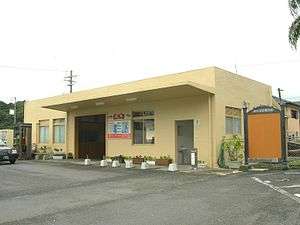Nangō Station
Nangō Station 南郷駅 | |
|---|---|
 Nangō Station in 2010 | |
| Location | Japan |
| Coordinates | 31°32′09″N 131°22′22″E / 31.53583°N 131.37278°ECoordinates: 31°32′09″N 131°22′22″E / 31.53583°N 131.37278°E |
| Operated by |
|
| Line(s) | ■ Nichinan Line |
| Distance | 53.0 km from Minami-Miyazaki |
| Platforms | 1 side platform |
| Tracks | 1 + 1 siding |
| Construction | |
| Structure type | At grade |
| Other information | |
| Status | Kan'i itaku agent on site |
| Website | Official website |
| History | |
| Opened | 1 March 1936 |
| Traffic | |
| Passengers (FY2016) | 167 daily |
| Location | |
 Nangō Station Location within Japan | |
Nangō Station (南郷駅 Nangō-eki) is a train station in Nichinan City, Miyazaki Prefecture, Japan. It is operated by of JR Kyushu and is on the Nichinan Line.[1][2]
Lines
The station is served by the Nichinan Line and is located 53.0 km from the starting point of the line at Minami-Miyazaki.[3]
Layout
The station consists of a side platform serving a single track at grade with a siding. The station building is a simple concrete block structure which houses a ticket window and a waiting area. The station is not staffed by JR Kyushu but some types of tickets are available from a kan'i itaku agent on site who manages the ticket window.[3][2][4]
 The platform and track. The siding can be seen to the left.
The platform and track. The siding can be seen to the left.
Adjacent stations
| ← | Service | → | ||
|---|---|---|---|---|
| Nichinan Line | ||||
| Ōdōtsu | Local | Taninokuchi | ||
History
Japanese Government Railways (JGR) had opened the Shibushi Line from Nishi-Miyakonojō to Sueyoshi (now closed) in 1923. By 1925, the line had been extended eastwards to the east coast of Kyushu at Shibushi. The line was then extended northwards in phases, reaching Yowara by 1935. The track was extended further north with Ōdōtsu opening as the northern terminus on 1 March 1936. On the same day, Nangō opened as an intermediate station the new track. The route was designated the Nichinan Line on 8 May 1963. With the privatization of JNR on 1 April 1987, the station came under the control of JR Kyushu.[5][6][7]
Passenger statistics
In fiscal 2016, the station was used by an average of 167 passengers (boarding only) per day.[8]
See also
References
- ↑ "JR Kyushu Route Map" (PDF). JR Kyushu. Retrieved 23 February 2018.
- 1 2 "南郷" [Nangō]. hacchi-no-he.net. Retrieved 12 May 2018.
- 1 2 Kawashima, Ryōzō (2013). 図説: 日本の鉄道 四国・九州ライン 全線・全駅・全配線・第7巻 宮崎・鹿児島・沖縄エリア [Japan Railways Illustrated. Shikoku and Kyushu. All lines, all stations, all track layouts. Volume 7 Miyazaki Kagoshima Okinawa Area] (in Japanese). Kodansha. pp. 57, 96. ISBN 9784062951661.
- ↑ "南郷駅" [Nangō Station]. jr-mars.dyndns.org. Retrieved 12 May 2018. See images of tickets sold.
- ↑ Ishino, Tetsu et al. (eds.) (1998). 停車場変遷大事典 国鉄・JR編 [Station Transition Directory - JNR/JR] (in Japanese). I. Tokyo: JTB Corporation. pp. 232–3. ISBN 4533029809.
- ↑ Ishino, Tetsu et al. (eds.) (1998). 停車場変遷大事典 国鉄・JR編 [Station Transition Directory - JNR/JR] (in Japanese). II. Tokyo: JTB Corporation. p. 775. ISBN 4533029809.
- ↑ Imao, Keisuke (2009). 日本鉄道旅行地図帳 12号 九州 沖縄―全線・全駅・全廃線 [Japan Rail Travel Atlas No. 12 Kyushu Okinawa - all lines, all stations and disused lines] (in Japanese). Mook. pp. 21, 62–3. ISBN 9784107900302.
- ↑ "宮崎県統計年鑑 鉄道輸送実績(1日平均)" [Miyazaki Prefecture Statistics Yearbook Railway Transportation Record (daily average)]. Miyazaki Prefectural Government website. Retrieved 6 May 2018. See the table for 平成28年度 [fiscal 2016].
| Wikimedia Commons has media related to Nangō Station. |
External links
- Nangō (JR Kyushu)(in Japanese)